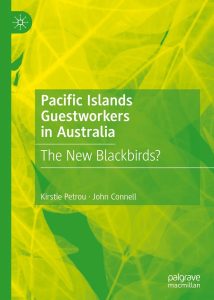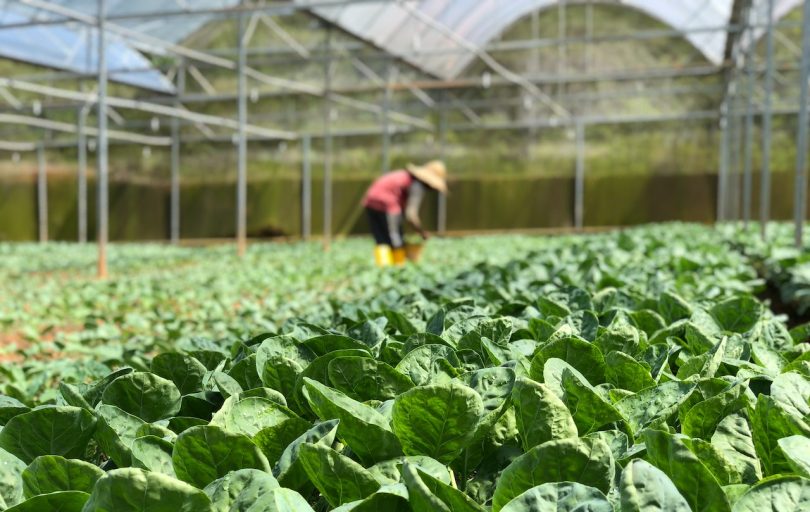 We would like to thank Stephen Howes and Richard Curtain for jointly taking the time to review our book Pacific Islands Guestworkers in Australia: The New Blackbirds? It is a measure of the significance of the topic that they persevered through the 500 plus pages. No book of this length is without flaws, not least this first detailed review of a scheme as complex as the Seasonal Worker Programme (SWP). We welcome and agree with many of their criticisms, but find others less helpful.
We would like to thank Stephen Howes and Richard Curtain for jointly taking the time to review our book Pacific Islands Guestworkers in Australia: The New Blackbirds? It is a measure of the significance of the topic that they persevered through the 500 plus pages. No book of this length is without flaws, not least this first detailed review of a scheme as complex as the Seasonal Worker Programme (SWP). We welcome and agree with many of their criticisms, but find others less helpful.
First, Howes and Curtain question our omission of Timor-Leste. We did so since Timor-Leste is not a Pacific Island state. Moreover, we believe it is vital to understand the people and places we discussed. As neither of us has visited Timor-Leste, the only source country we have never been to, we felt we could not adequately do that.
Second, a key criticism was our “negative” tone. Howes and Curtain suggest our attitude towards the SWP was too ambivalent. Perhaps this is because ambivalence is a key theme in many of the qualitative studies we consulted. As Mary, a recruiting agent from Vanuatu told Rachel Smith: “When I first heard about the [RSE] scheme … I sat down for a long time after that I started to think, ‘Good side, yes’. But there will also be the ‘bad sides’.” It is this tension between the “good” and the “bad” that we have tried to capture. True, workers and their communities generally agree that the positives of guestwork outweigh the negatives, but this does not mean that the negatives are trivial.
Third, Howes and Curtain note that, when paid correctly, SWP workers receive casual rates which are above the minimum wage. We agree that this is the case, but note this places them only above international students and backpackers. Moreover, a growing volume of reports, investigations and media stories point to widespread migrant worker exploitation in Australia. Yet we do not mean to suggest that all workers are exploited or underpaid. Unfortunately success stories are rarely documented.
Fourth, Howes and Curtain suggest that our analysis is too reliant on “anecdotes”. This is a familiar critique and misconception of qualitative research. Our data was collected via culturally and contextually appropriate talanoa-style conversations in Bislama and Tok Pisin, that enabled empathy, rapport and trust, often lacking in large-scale exit-style surveys (although these are valuable in their own right). The COVID-19 pandemic prevented the continuation of such discussions, so we sought out other accounts (in what another review of the book has described as a “bowerbird approach”).
At some point (and having consulted roughly 630 references), what Howes and Curtain have derided as “anecdotes” tally up, and indeed many of the issues and conclusions we draw from our “anecdotes” are now being documented in emerging large-scale studies of guestworker schemes in Australia and more broadly across the seasonal and temporary schemes in Australia and New Zealand. As we were at pains to point out throughout the book, there is little good data on the complex impacts of the SWP over time. More is needed.
Fifth, Howes and Curtain further suggest that our discussion of guestwork in different contexts and at different points in time presents a “confusing picture”. This approach was intended to highlight the longstanding nature of issues such as wage theft and unsuitable accommodation. Indeed, we also brought in examples from other guestworker schemes around the world. Our intention was not to confuse, but to demonstrate the ubiquity of some of these problems.
Sixth, Howes and Curtain claim that by participating in guestwork, Pacific Islanders are “acting as agents of their own development”. Indeed so, but here too there are complexities. Research demonstrates that workers are very aware of the tensions between self-reliance and dependence that come with relying on Australia and New Zealand for employment. Increasingly, Pacific Island governments have expressed concerns over an accelerating brain and skill drain affecting the public and private sectors: Samoa temporarily halted labour mobility departures while Vanuatu has introduced a new visa to import skilled labour. Alongside this are the social impacts associated with family separation.
These concerns raise questions about what development entails and whether economic criteria alone are an adequate means of assessment. We sought to take a broader perspective. Is it one of the paradoxes of development that greater precarity is set against a backdrop of “economic” development? We would certainly like to know.
Seventh, Howes and Curtain take issue with the book’s title question “The New Blackbirds?” We do not apologise for the alluring title, which was chosen as a deliberate provocation – it certainly seems to have struck a nerve with our reviewers. As we argue in the book, there are historical parallels and there are, of course, many differences. Migration is now much better regulated and the SWP has many inbuilt safeguards. But many of the structures and contexts of temporary labour migration remain the same. Significantly, workers’ understandings of temporary labour migration are not ahistorical, and many SWP workers understand their experiences against histories of blackbirding.
As we stress in the book, there remain huge gaps in what we know and don’t know about the SWP. So little has been documented on the impacts and outcomes beyond important but generalised truisms about superior incomes, better housing, water supplies and more material possessions, which are unquestionably important, but only tell part of the story. Is uneven development and inequity another outcome? Above all, we argue that the SWP needs to be assessed much more effectively. We would prefer our “anecdotes” to be examined further and less dogmatically, but especially within the source countries.
The SWP has brought many benefits, but not everyone’s experience of the scheme is entirely positive. As an ambivalent ni-Vanuatu worker told us some time ago: “So we just have to be humble, and put up with it. We have to keep working until it is time to go home, and then we’ll be able to breathe easily again. That’s just how it is.” No doubt just another anecdote. Even after 500 pages we could not fill all the gaps.


Thank you for this commentary and the book. I was very happy and inspired to read this. Hopefully there will continue to be similar critical academic perspectives and field-based qualitative research on the Pacific labor mobility schemes, especially taking into account the ‘anecdotes’ and first-hand lived experiences of the migrants.